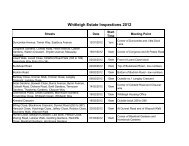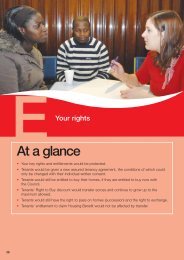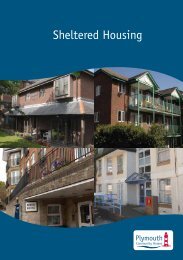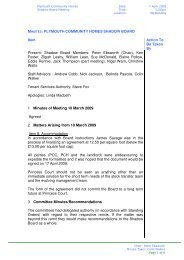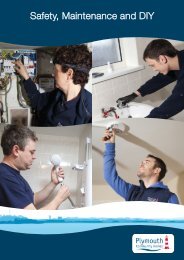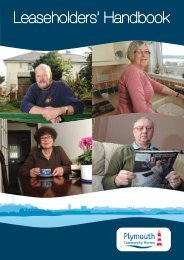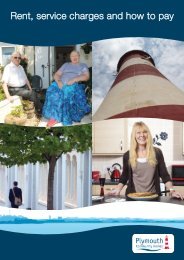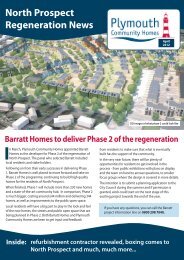Offer Document - Plymouth Community Homes
Offer Document - Plymouth Community Homes
Offer Document - Plymouth Community Homes
You also want an ePaper? Increase the reach of your titles
YUMPU automatically turns print PDFs into web optimized ePapers that Google loves.
BAbout <strong>Plymouth</strong> <strong>Community</strong> <strong>Homes</strong><br />
At a glance<br />
<strong>Plymouth</strong> <strong>Community</strong> <strong>Homes</strong>:<br />
• Is a not-for-profit organisation and would have charitable status.<br />
• Has been specifically set up to take over ownership and management of <strong>Plymouth</strong> City<br />
Council’s homes and management of leaseholder services.<br />
• Has been set up with 12 voluntary, unpaid Board Members, including three tenants and<br />
one leaseholder, who would run the association.<br />
• Would be registered with and regulated by the Housing Corporation.<br />
• Would have a legally binding agreement with the Council to ensure all the promises<br />
contained in this document are met.<br />
15
What type of organisation<br />
is <strong>Plymouth</strong> <strong>Community</strong><br />
<strong>Homes</strong>?<br />
<strong>Plymouth</strong> <strong>Community</strong> <strong>Homes</strong> would be a<br />
Social Landlord, registered with the Housing<br />
Corporation. The prime objective of<br />
Registered Social Landlords is the provision<br />
of affordable rented housing to people in<br />
housing need.<br />
It is an Industrial<br />
and Provident<br />
Society. It is a<br />
not-for-profit<br />
organisation which<br />
means that all of its<br />
income would have to be put back into its<br />
housing, repaying loans and providing<br />
services to tenants. Because it would not be<br />
run for profit no dividends could be paid out.<br />
The association would also be registered<br />
with charitable rules. One advantage of<br />
charitable status is that charities pay less tax<br />
which allows them to make best use of their<br />
income for the benefit of those persons they<br />
are assisting.<br />
As a charitable organisation the association<br />
would be limited in who it could house and<br />
the activities that it would be allowed to<br />
carry out. As a starting point it would adopt<br />
the Council’s current allocations policy, and<br />
consult with tenants when developing that<br />
policy over time.<br />
It would not be able to:<br />
• Carry out extensive commercial activities.<br />
• Provide services to other outside<br />
organisations which are not charities.<br />
• Provide commercial rented<br />
accommodation.<br />
The association has been set up with the<br />
help of the Council specifically to take over<br />
the ownership and management of the<br />
Council’s homes, if tenants vote in favour<br />
of transfer.<br />
<strong>Plymouth</strong> <strong>Community</strong> <strong>Homes</strong> would:<br />
• Be run by a Board made up of 12<br />
members who would take the main<br />
decisions. There is a Shadow Board<br />
already in place and Shadow Board<br />
members have worked with the Council<br />
to put together this document. The<br />
Shadow Board is made up of three<br />
tenants, one leaseholder, four people<br />
nominated by the Council and four<br />
independent local people.<br />
• Have a general membership comprising<br />
55% tenants, 15% independents and<br />
30% Council. The general membership<br />
have powers to make decisions that are<br />
fundamental to the constitution and<br />
structure of the association, but do not<br />
take part in the day-to-day running of<br />
the association.<br />
• Be committed to building communities<br />
and creating neighbourhoods in which<br />
people want to live.<br />
• Be based in <strong>Plymouth</strong>, which would be<br />
its main focus of operation.<br />
Who is on the Board of<br />
<strong>Plymouth</strong> <strong>Community</strong> <strong>Homes</strong><br />
and what do they do?<br />
If transfer takes place the Board of<br />
Management would have overall<br />
responsibility for running the association<br />
including setting policies and directing<br />
activities.<br />
The Board is currently operating in ‘shadow’<br />
form. All Shadow Board Members have the<br />
same voting rights on the Board as each<br />
other and have a duty to act in the best<br />
interests of the association whether in<br />
shadow or full operation. Details of the<br />
current Board Members are given over the<br />
next four pages.<br />
How were the Board<br />
Members chosen?<br />
The three tenants and one leaseholder were<br />
elected following a process which involved<br />
16
About <strong>Plymouth</strong> <strong>Community</strong> <strong>Homes</strong><br />
inviting tenants and leaseholders to consider<br />
standing and taking part in an election.<br />
The four Council Board Members were<br />
selected by elected Councillors on a basis<br />
that reflects the current political composition<br />
of the Council.<br />
The four independent people were chosen<br />
by both the tenant and Council Board<br />
Members following advertisements in the<br />
local press and through an interview<br />
process. They are not connected with the<br />
Council and were chosen for their skills and<br />
experience. They have valuable experience<br />
and expertise (not just in housing) to ensure<br />
the Board fulfils the Housing Corporation’s<br />
strict guidance on how the organisation is run.<br />
Who are the Board<br />
Members?<br />
Tenants:<br />
Peter Ebsworth<br />
Peter has been a tenant<br />
representative for almost<br />
three years, giving him<br />
knowledge and understanding<br />
of how the housing sector<br />
and various housing services work.<br />
He is enthusiastic about using his position<br />
as a Board Member to help deliver decent<br />
homes to tenants across <strong>Plymouth</strong>.<br />
Peter said: “I wanted to be a Board Member<br />
because I believe transfer will make a big<br />
difference to tenants. I want to achieve the<br />
best possible results and standards for<br />
them.”<br />
Peter, a father-of-three, who lives in<br />
Whitleigh, has achieved the Chartered<br />
Institute of Housing Level Two qualification<br />
and has attended a number of courses to<br />
learn more about housing.<br />
Nigel Warn<br />
Nigel has been a Council<br />
tenant for almost 30 years<br />
and lives in Mount Gould.<br />
He is employed by DML in<br />
<strong>Plymouth</strong> and has been a<br />
union representative with GMB for seven<br />
years, giving him a valuable insight into<br />
workplace laws.<br />
Nigel is also a certified Health and Safety<br />
representative, and has extensive working<br />
knowledge of risk assessments and<br />
workplace planning procedure.<br />
Over the years, Nigel has sat on numerous<br />
committees including Health and Safety,<br />
Sports and Social and has received basic<br />
counselling training.<br />
Nigel said: “I wanted to join the Shadow<br />
Board because I wanted to help tenants get<br />
the standards for the future. I am particularly<br />
interested in helping people with disabilities<br />
in terms of adaptations to their homes, as I<br />
have a disability myself.”<br />
Nigel, who is married with two grown-up<br />
children, is currently in charge of a small<br />
team of workers as a learning representative.<br />
Elaine Pellow<br />
Elaine was born and raised in<br />
<strong>Plymouth</strong> and has lived in the<br />
City for the past 46 years.<br />
She has always had a keen<br />
interest in working with<br />
people. “I wanted to be on<br />
the Shadow Board as I would like to see the<br />
best service possible delivered when it<br />
comes to carrying out improvements to<br />
tenants’ homes,” she said.<br />
“I believe I have the determination,<br />
dedication and time to serve tenants both<br />
fairly and thoroughly and would ensure that<br />
<strong>Plymouth</strong> <strong>Community</strong> <strong>Homes</strong> delivered on<br />
its promises to tenants and leaseholders.”<br />
Elaine lives in Morice Town and is a former<br />
training officer of modern apprenticeships.<br />
She also recently received a community<br />
volunteering award for her services to the<br />
community.<br />
B<br />
17
Leaseholder:<br />
Christine Watts<br />
Christine has been a<br />
leaseholder since the 1980s.<br />
Her experience of housing<br />
management spans more<br />
than 20 years and includes<br />
playing a key role in<br />
developing, and maintaining a resident<br />
managed organisation at Pembroke Estate<br />
in Devonport, where she lives.<br />
Christine has strong people skills and has<br />
worked on a range of community-based<br />
issues both City-wide and at national level<br />
over the years.<br />
In 1995, Christine was awarded an MBE for<br />
her services to the community and hopes to<br />
bring her understanding of people and their<br />
communities to the Board.<br />
Christine said: “I understand from<br />
experience how changes in management<br />
can often bring about new opportunities. I<br />
believe transfer would unlock many such<br />
opportunities for tenants and leaseholders in<br />
the City.”<br />
Council appointees:<br />
Ken Foster<br />
Councillor Foster represents<br />
the Plymstock Radford Ward.<br />
He was appointed Deputy<br />
Lord Mayor last year and has<br />
been a councillor for 11 years.<br />
He is a member of the<br />
<strong>Plymouth</strong> Local Access Forum and the<br />
Plymstock Area Committee.<br />
He has also been appointed to the Brock<br />
Trust, <strong>Plymouth</strong> Local Access Forum, the<br />
South West Local Government Association<br />
and the South West Regional Assembly.<br />
Eddie Rennie<br />
Councillor Rennie has been a<br />
councillor for 11 years and<br />
represents the Sutton and<br />
Mount Gould Ward. He has<br />
been a Council tenant for<br />
over 20 years.<br />
He is a member of the Licensing Committee<br />
(both Miscellaneous and Hackney Carriage)<br />
and the Drake, Efford & Lipson and Sutton &<br />
Mount Gould Area Committee.<br />
Additionally, he has been appointed to the<br />
Ballard Trust, the Devon and Somerset Fire<br />
and Rescue Authority, the East End<br />
Development Trust and the East End<br />
Partnership.<br />
Jack Thompson<br />
Councillor Thompson was<br />
elected in May 2008 to<br />
represent Budshead Ward.<br />
Cllr Thompson worked in<br />
Africa for 25 years for<br />
international aid agencies in<br />
the development finance sector. This<br />
included managing and advising banks and<br />
helping businesses to get bank loans.<br />
He is a member of the Council’s Audit<br />
Committee and the Resources and<br />
Performance Overview and Scrutiny Panel.<br />
He is married with four children. Now retired,<br />
he teaches Bridge with his wife who is from<br />
<strong>Plymouth</strong>.<br />
Susan McDonald<br />
Councillor McDonald<br />
represents the Labour Party<br />
in the St Peter & Waterfront<br />
Ward.<br />
She has been a Councillor for<br />
two years and prior to joining<br />
the Shadow Board worked as a director of<br />
the Millfields Trust and the <strong>Plymouth</strong> District<br />
and <strong>Community</strong> Health Council Board.<br />
She said: “I have had direct experience of<br />
social housing as I have been a Council<br />
tenant in the past and hope to bring this<br />
valuable experience to the Shadow Board.”<br />
Having been a board director, she gained<br />
valuable economic and community<br />
experience and as a councillor regularly<br />
deals with transport and waste management<br />
issues.<br />
18
About <strong>Plymouth</strong> <strong>Community</strong> <strong>Homes</strong><br />
She is a member of the Devonport, Stoke<br />
and St Peter & the Waterfront Area<br />
Committee, the Licensing Committee<br />
(Hackney Carriage), the Standing Advisory<br />
Council on Religious Education and the<br />
Sustainable Communities Overview and<br />
Scrutiny Panel.<br />
A mother-of three and grandmother-of-two,<br />
Cllr McDonald, works part-time as a<br />
registered nurse at Nazareth House Convent<br />
in <strong>Plymouth</strong>.<br />
Independents:<br />
Zilpah Leahy<br />
Zilpah is a housing manager<br />
and brings to the Shadow<br />
Board over 25 years’<br />
experience of working for<br />
local authority housing<br />
services and a Registered<br />
Social Landlord.<br />
She specialises in housing management and<br />
has a wealth of experience in general<br />
housing management, sheltered housing<br />
and repairs services.<br />
Other aspects of her current role with a<br />
housing association include managing and<br />
addressing personnel issues, staff planning<br />
and dealing with performance, disciplinary<br />
and related issues.<br />
She assisted with the transfer of 3,000<br />
houses in the South Hams to housing<br />
association Tor <strong>Homes</strong> and for around two<br />
years, managed around 1,400 properties in<br />
the <strong>Plymouth</strong> area while Tor were part of the<br />
William Sutton Group.<br />
Zilpah wanted to become a Shadow Board<br />
Member in order to use her knowledge of<br />
housing transfer and experience as a<br />
housing manager.<br />
She said: “I intend to make a meaningful<br />
and practical contribution to the Shadow<br />
Board by using my experience of the<br />
transfer process and involvement in several<br />
major tenant consultation initiatives.”<br />
Linda Macbeth<br />
Linda is currently a Senior<br />
Management Consultant in<br />
the Public Private Partnering<br />
Sector and a South West<br />
Committee member of the<br />
Chartered Institute of Housing.<br />
A Housing Policy and Management<br />
graduate and postgraduate business<br />
student, Linda has gained several years of<br />
business and management experience in<br />
both the public and private sectors.<br />
Linda previously worked for housing<br />
associations in the South West. However,<br />
more recently, she has acted as a<br />
management consultant on the development<br />
of major long term community regeneration<br />
programmes throughout the UK.<br />
Linda is currently advising and developing a<br />
business plan for a new RSL organisation,<br />
based in the Midlands, which consists of<br />
eight housing organisations who will work<br />
together to ensure efficiencies and savings<br />
are achieved.<br />
Linda said: “I hope to bring my public and<br />
private sector business consulting skills and<br />
experience to the Board to assist in the<br />
provision of the best possible service for<br />
customers.”<br />
Louise Barnden<br />
Louise is a housing<br />
consultant with vast<br />
experience of management<br />
during her 25 years of<br />
experience in the housing<br />
sector.<br />
She has understanding of both housing<br />
development and the culture change<br />
required when staff transfer from a local<br />
authority to a housing association.<br />
Louise recently worked with tenants and<br />
staff to conduct audits and develop good<br />
practice for North Warwickshire District<br />
Council, a Midlands-based local authority in<br />
preparation for its Audit Commission<br />
inspection.<br />
B<br />
19
She has knowledge of housing law, through<br />
Chartered Institute of Housing qualifications,<br />
and was involved in the registration and<br />
development of Devon-based Riviera<br />
Housing Trust’s constitution and registration<br />
with the Housing Corporation.<br />
In the past, Louise has carried out work for<br />
a number of boards and has run training<br />
and away days on a variety of topics<br />
including governance, business planning<br />
and risk management.<br />
Louise said: “As a Board Member of<br />
<strong>Plymouth</strong> <strong>Community</strong> <strong>Homes</strong> my primary<br />
focus will be on providing high quality<br />
homes for tenants and leaseholders.”<br />
William Lean<br />
A chartered surveyor, William<br />
is a partner in charge of the<br />
<strong>Plymouth</strong> Office of a firm of<br />
property and asset<br />
consultants and valuers.<br />
He has been involved in the<br />
property market in <strong>Plymouth</strong> and across the<br />
South West for the past 26 years, including<br />
buying and selling land and buildings for<br />
residential development and for valuing<br />
schemes for loan security funding and grant<br />
assistance purposes.<br />
He has strong skills in property finance<br />
through his valuation and development<br />
experience gained over many years.<br />
William owned his own property consulting<br />
business with seven staff for a number of<br />
years before merging with his current firm,<br />
which has 200 staff. William is currently<br />
responsible for a team of surveyors<br />
operating across Devon and Cornwall.<br />
“I want to bring my financial and property<br />
experience to the Board to help play a part<br />
in improving tenants’ homes and<br />
communities across the City,” said William,<br />
who has lived in the City for 20 years and<br />
brought up his children locally.<br />
Do Board Members get<br />
paid?<br />
No. Although the Housing Corporation<br />
allows a reasonable payment, none is<br />
currently proposed for <strong>Plymouth</strong> <strong>Community</strong><br />
<strong>Homes</strong>. Board Members have been<br />
recruited to serve on a voluntary basis.<br />
However, Board Members can claim<br />
reasonable out-of-pocket expenses, such as<br />
reasonable travel expenses actually incurred<br />
in carrying out the association’s business,<br />
and upon production of receipts.<br />
If transfer goes ahead, how<br />
would Board Members be<br />
chosen in the future?<br />
The current Shadow Board Members would<br />
serve until at least the first Annual General<br />
Meeting (AGM) of the association after the<br />
transfer takes place (likely to be in 2009). At<br />
that, and each subsequent AGM, the tenant,<br />
leaseholder and independent Board<br />
Members would retire on a rotational basis.<br />
This would provide continuity and a process<br />
for gradual renewal of the Board. Retiring<br />
Board Members would be eligible for reselection<br />
at each AGM up to a maximum of<br />
nine years.<br />
Council Board Members would be chosen<br />
by the Council and hold office for a period<br />
determined by the Council but no longer<br />
than three years without re-nomination and<br />
would also be eligible for re-selection up to a<br />
maximum of nine years.<br />
Tenant and leaseholder Board Members<br />
would be elected through tenant and<br />
leaseholder-wide elections, details of which<br />
would be widely advertised.<br />
Independent Board Members would be<br />
chosen for their skills and recommended for<br />
election at the AGM of the association. All<br />
the members of the association would be<br />
eligible to vote in elections for independent<br />
Board Members.<br />
20
About <strong>Plymouth</strong> <strong>Community</strong> <strong>Homes</strong><br />
What are the core values<br />
and objectives of <strong>Plymouth</strong><br />
<strong>Community</strong> <strong>Homes</strong>?<br />
<strong>Plymouth</strong> <strong>Community</strong> <strong>Homes</strong> would aim to<br />
offer the best possible standards and<br />
service to its tenants and would apply the<br />
following values to all that it does: The<br />
association is committed to being:<br />
• Innovative<br />
• Ethical<br />
• Responsive<br />
• Inclusive<br />
The association has adopted the following<br />
objectives which are to:<br />
• Provide better places to live<br />
• Put residents first<br />
• Be a good place to work<br />
• Provide excellent leadership<br />
Who would provide the<br />
service and what would<br />
happen to the existing staff?<br />
The association would employ paid staff to<br />
run the housing service on a day-to-day<br />
basis. If the transfer goes ahead, employees<br />
who deal with the management and<br />
maintenance of your homes, such as<br />
housing officers, together with related<br />
support service employees, would transfer<br />
to the association. Their conditions of<br />
employment at the time of transfer would be<br />
protected under the Transfer of Undertakings<br />
Protection of Employment (TUPE)<br />
regulations.<br />
So you would continue to deal with people<br />
you know. This would ensure continuity of<br />
service for tenants and means the<br />
association would have a skilled and<br />
experienced workforce to rely on.<br />
The additional work which would be<br />
undertaken by the association could create<br />
employment opportunities for people locally.<br />
Housing staff who deal with homelessness,<br />
housing advice, private sector housing and<br />
strategic housing work would stay with the<br />
Council.<br />
Who regulates and<br />
inspects <strong>Plymouth</strong><br />
<strong>Community</strong> <strong>Homes</strong>?<br />
The Housing<br />
Corporation is<br />
the Government<br />
appointed body<br />
that regulates all<br />
Registered Social<br />
Landlords<br />
including the<br />
association.<br />
The association must achieve registration<br />
with the Housing Corporation as a<br />
Registered Social Landlord (RSL) before a<br />
transfer can take place.<br />
B<br />
21
The Housing Corporation:<br />
• Has established a regulatory code with<br />
which all Registered Social Landlords<br />
must comply. The code sets the Housing<br />
Corporation's expectations which all<br />
Registered Social Landlords must follow.<br />
These expectations are set to ensure<br />
that tenants’ rights are protected,<br />
services are of a high quality and<br />
financial management is sound.<br />
• Monitors the performance of Registered<br />
Social Landlords to ensure these<br />
expectations are met. If <strong>Plymouth</strong><br />
<strong>Community</strong> <strong>Homes</strong> did not meet these<br />
expectations, the Housing Corporation<br />
has extensive powers to step in and<br />
make sure things are put right.<br />
In January 2007 the Government announced<br />
that it planned to split the activities of the<br />
Housing Corporation. The regulation and<br />
registration functions are to transfer to a<br />
new independent social housing regulator,<br />
The Tenant Services Authority.<br />
The finances of <strong>Plymouth</strong> <strong>Community</strong><br />
<strong>Homes</strong> would also be monitored by external<br />
auditors who would be appointed if transfer<br />
takes place. This means that there would be<br />
safeguards in place to prevent the<br />
association getting into financial difficulties.<br />
The Housing Corporation/Tenant Services<br />
Authority would monitor the financial<br />
performance of the association, particularly<br />
during its early years of operation, and is<br />
able to take action if a Registered Social<br />
Landlord gets into difficulties to ensure that<br />
tenants and leaseholders are protected.<br />
In addition, the Audit Commission (through<br />
its Housing inspectorate) would have a role<br />
in checking the standard of service delivered<br />
by the association and other Registered<br />
Social Landlords.<br />
Working closely with the<br />
Council<br />
Before a transfer could take place <strong>Plymouth</strong><br />
<strong>Community</strong> <strong>Homes</strong> would enter into a<br />
formal and legally binding contract with the<br />
Council. This agreement would allow the<br />
Council to make sure that the promises<br />
made to tenants by the Council in this<br />
document are kept. If there were any<br />
suggestion of the association failing to<br />
honour the promises, the Council could<br />
enforce them.<br />
Tenants would be protected by<br />
arrangements set up by the Council to<br />
monitor the association’s performance. As<br />
part of those arrangements, the Council<br />
would need to be consulted about any<br />
proposed changes to the conditions of your<br />
Tenancy Agreement before your written<br />
consent was sought.<br />
The association would aim to ensure that<br />
properties are let quickly and efficiently, and<br />
that the time properties remain empty is<br />
kept to a minimum. It would also assist the<br />
Council in fulfilling its legal duty to house<br />
homeless people.<br />
What about <strong>Plymouth</strong><br />
<strong>Community</strong> <strong>Homes</strong>’ staff?<br />
The association recognises that its staff<br />
would be its greatest asset and it would set<br />
out to be an employer that people would<br />
want to work for. Its aim would be to retain<br />
and attract quality staff by making the<br />
working experience rewarding, challenging<br />
and enjoyable.<br />
There would be a comprehensive training<br />
programme for staff and a commitment to<br />
the expansion of apprenticeship and local<br />
employment schemes.<br />
22
CImproving and repairing your home<br />
At a glance<br />
<strong>Plymouth</strong> <strong>Community</strong> <strong>Homes</strong> would:<br />
• Have a budget of £168 million to invest in your homes over the first five years and in the<br />
region of £1 billion over 30 years.<br />
• Plan to bring all homes up to the <strong>Plymouth</strong> <strong>Community</strong> <strong>Homes</strong> Standard, including (where<br />
appropriate) new kitchens and bathrooms (with over-bath showers), central heating, new<br />
external security doors and double glazed windows within five years.<br />
• When fitting new kitchens and bathrooms, as part of the improvements programme, spend<br />
approximately £3 million over the first five years on adaptations, to ensure that they are<br />
fitted with consideration to tenants' disabilities, including for example, walk in showers.<br />
In addition, it would have a budget of £350,000 every year for the first five years to clear,<br />
as a priority, any backlog of adaptations with the Council at the time of transfer.<br />
• Carry out a review of its responsive repairs service within its first year.<br />
• Be committed to introducing a Handyperson Service within two years of transfer – to assist<br />
tenants with carrying out minor jobs which are the tenant’s responsibility. A charge would<br />
be made for this service.<br />
23
The <strong>Plymouth</strong> <strong>Community</strong><br />
<strong>Homes</strong> Standard<br />
To meet the <strong>Plymouth</strong> <strong>Community</strong> <strong>Homes</strong><br />
Standard, the package of works each home<br />
would receive would depend on its current<br />
condition.<br />
The association has budgeted to carry out<br />
the full programme of works identified in the<br />
2007 survey on the condition of the<br />
Council’s homes in order to maintain them<br />
to the <strong>Plymouth</strong> <strong>Community</strong> <strong>Homes</strong> Standard.<br />
This would include replacing major<br />
components such as central heating<br />
systems, windows, external doors, kitchens<br />
and bathrooms as they wear out, as well as<br />
upgrading or renewing roofs.<br />
The following tables set out a<br />
comparison between the basic Decent<br />
<strong>Homes</strong> Standard and the <strong>Plymouth</strong><br />
<strong>Community</strong> <strong>Homes</strong> Standard.<br />
PLANNED MAINTENANCE AND IMPROVEMENTS<br />
<strong>Plymouth</strong><br />
<strong>Community</strong> <strong>Homes</strong><br />
Decent <strong>Homes</strong> Standard<br />
<strong>Plymouth</strong> <strong>Community</strong> <strong>Homes</strong> Standard<br />
Windows<br />
There would be a limited window upgrade<br />
programme to approximately 1,500<br />
properties to replace single glazing with<br />
double glazed units. These would be<br />
high quality double glazed PVCu (plastic<br />
framed) windows which have high levels<br />
of energy efficiency, completed over<br />
15 years. These would include:<br />
• Secure locking handles to ground<br />
floor and vulnerable windows.<br />
• Restrictor bars on windows.<br />
Repairs to individual windows would be<br />
carried out as necessary in accordance<br />
with a revised repairs policy based on<br />
legal minimum requirements.<br />
The new association would continue<br />
with the Council’s existing programme<br />
and install new high quality double<br />
glazed PVCu (plastic framed) windows<br />
which have high levels of energy<br />
efficiency to approximately 3,800<br />
properties. This would be completed<br />
within five years of transfer and include:<br />
• Secure locking handles to ground<br />
floor and vulnerable windows.<br />
• Restrictor bars on windows.<br />
• A maintenance programme<br />
undertaken on all windows and<br />
doors.<br />
24
Improving and repairing your home<br />
<strong>Plymouth</strong><br />
<strong>Community</strong> <strong>Homes</strong><br />
Decent <strong>Homes</strong> Standard<br />
<strong>Plymouth</strong> <strong>Community</strong> <strong>Homes</strong> Standard<br />
There would be a limited kitchen<br />
replacement programme of<br />
approximately 1,750 - 2,000 in five<br />
years, with basic fixtures and fittings.<br />
Repair work to individual kitchen<br />
elements would be carried out as<br />
necessary in accordance with a revised<br />
repairs policy based on legal minimum<br />
requirements.<br />
Kitchens<br />
Kitchens would be modernised and<br />
tenants given a choice of worktops,<br />
doors and tiles. Approximately 14,000<br />
new high quality kitchens would be fitted<br />
in the first five years following transfer.<br />
New kitchens would include:<br />
• A choice of wall tiling and slip resistant<br />
flooring.<br />
• A choice of colour finishes to unit doors.<br />
• A choice of colour finishes to kitchen<br />
worktops.<br />
• Lever taps as optional.<br />
• Individual design service to maximise<br />
the available work surface.<br />
• Units to be fitted with consideration<br />
given to tenants’ disabilities.<br />
• Extractor fan as standard where<br />
practicable.<br />
C<br />
Heating<br />
Continue with a renewal programme<br />
leading to approximately 3,500<br />
replacement systems in five years.<br />
This would focus on replacing obsolete<br />
boilers when they break down.<br />
Carry out repair works to keep existing<br />
heating systems in working order in<br />
accordance with a revised repairs policy<br />
based on legal minimum requirements.<br />
All homes which currently fail the Decent<br />
<strong>Homes</strong> Standard would be offered new<br />
full gas central heating systems with<br />
approximately 5,000 systems being<br />
replaced in the first five years following<br />
transfer. All new systems would include:<br />
• Radiators that are thermostatically<br />
controlled – with controls at a<br />
convenient height in sheltered<br />
properties and bungalows, and for<br />
tenants with disabilities on request.<br />
• Energy efficient condensing boilers.<br />
All properties with solid fuel or electric<br />
night storage heaters would be offered<br />
gas central heating if practicable.<br />
25
<strong>Plymouth</strong><br />
<strong>Community</strong> <strong>Homes</strong><br />
Decent <strong>Homes</strong> Standard<br />
<strong>Plymouth</strong> <strong>Community</strong> <strong>Homes</strong> Standard<br />
Bathrooms<br />
There would be a limited bathroom<br />
replacement programme of<br />
approximately 1,750 - 2,000 in five<br />
years at a basic specification – without<br />
over bath showers.<br />
Repair work to individual bathroom<br />
elements would be carried out in<br />
accordance with a revised repairs policy<br />
based on legal minimum requirements.<br />
Around 14,000 new, modern bathrooms<br />
would be fitted within five years allowing for:<br />
• Overbath electric showers and shower<br />
rails where technically practical.<br />
• Bathrooms to be fitted with<br />
consideration given to tenants’<br />
disabilities such as level access<br />
shower cubicles/wet rooms as<br />
appropriate and technically practical.<br />
• Lever taps as optional.<br />
• Extractor fan.<br />
• Slip resistant vinyl flooring in a choice<br />
of colours.<br />
• Tiles and decoration in a choice of colours.<br />
External Doors<br />
<strong>Homes</strong> would continue to have wooden<br />
doors repaired with a ‘like for like’<br />
replacement either through the planned<br />
external repair and maintenance<br />
programme following an eight year<br />
cycle or in accordance with a revised<br />
repairs policy based on legal minimum<br />
requirements. Doors opening into<br />
communal areas would have industry<br />
standard fire check doors.<br />
All properties that need them would be<br />
fitted with new PVCu (plastic) front and<br />
rear doors within five years of transfer.<br />
Front and rear doors would be of high<br />
quality and include five lever mortice<br />
locks and a choice of colours. This<br />
means that approximately 15,000<br />
properties would receive new external<br />
doors. As with the Council, doors<br />
opening into communal areas would have<br />
industry standard fire check doors.<br />
Thermal Insulation<br />
All properties that are able to be cavity<br />
wall insulated have been completed.<br />
Upgrades to the loft insulation to a<br />
thickness of 250mm would be completed<br />
in conjunction with the approximate<br />
3,500 central heating upgrades in five<br />
years, where necessary.<br />
All properties that are unable to be cavity<br />
wall insulated will be considered for an<br />
external insulation system for example,<br />
external cladding. Upgrades to the loft<br />
insulation to a thickness of 250mm<br />
would be completed in conjunction with<br />
the approximate 5,000 replacement<br />
central heating upgrades within five<br />
years, where necessary.<br />
26
Improving and repairing your home<br />
<strong>Plymouth</strong><br />
<strong>Community</strong> <strong>Homes</strong><br />
Decent <strong>Homes</strong> Standard<br />
<strong>Plymouth</strong> <strong>Community</strong> <strong>Homes</strong> Standard<br />
A minimum programme of work would<br />
be undertaken to meet the Decent<br />
<strong>Homes</strong> Standard which states: ‘Electrical<br />
systems should be no more than 30<br />
years old and be repaired or replaced if<br />
in poor condition’. The programme of<br />
installing hard wired smoke detectors<br />
would cease.<br />
Electrical Systems<br />
Would complete the electrical<br />
refurbishment of remaining properties<br />
(around 7,500 homes) within the first five<br />
years following transfer and domestic<br />
wiring would not exceed 30 years old. In<br />
addition, the association would finish the<br />
existing programme of providing two hard<br />
wired smoke detectors by 2019.<br />
C<br />
Security<br />
Would not be able to carry out any<br />
security improvements.<br />
Existing door entry systems would only<br />
be upgraded when they become<br />
obsolete or broken, when assessed as<br />
financially viable.<br />
Tenants would be offered (where appropriate):<br />
• Programme of installing or upgrading<br />
door entry systems (subject to service<br />
charging and the agreement of the<br />
occupants of the block) in flats and<br />
sheltered schemes.<br />
• Easier access to additional keys to blocks.<br />
• Digital CCTV (subject to service<br />
charging and agreement of the<br />
occupants of the block).<br />
• Gates on alleyways and other security<br />
measures where appropriate and<br />
where health and safety permits.<br />
• Additional security on outhouses –<br />
PVCu (plastic) doors with mortice<br />
locks – programme to start on transfer.<br />
Disabled Adaptations<br />
A prioritised programme of disabled<br />
adaptations would continue to be<br />
provided within available resourcescurrently<br />
£500,000 per annum although<br />
continued funding at this level could not<br />
be guaranteed. As any separate<br />
bathroom and kitchen replacement<br />
programme would be severely limited,<br />
any adaptations required to these rooms<br />
would be funded from this money.<br />
When fitting new kitchens and bathrooms<br />
as part of the improvements programme,<br />
would spend approximately £3 million<br />
over the first five years on adaptations, to<br />
ensure that they are fitted with<br />
consideration to tenants' disabilities,<br />
including for example, walk in showers. In<br />
addition, would have a budget of<br />
£350,000 every year for the first five years<br />
to clear, as a priority, any backlog of<br />
adaptations with the Council at the time of<br />
transfer.<br />
27
<strong>Plymouth</strong><br />
<strong>Community</strong> <strong>Homes</strong><br />
Decent <strong>Homes</strong> Standard<br />
<strong>Plymouth</strong> <strong>Community</strong> <strong>Homes</strong> Standard<br />
Environmental Improvements<br />
Would not be able to carry out any<br />
environmental improvements.<br />
The current annual environmental<br />
improvement budget of £220,000<br />
which is used to improve estates would<br />
be moved toward meeting the Decent<br />
<strong>Homes</strong> Standard.<br />
The association would commit a budget<br />
of £10 million in the first five years,<br />
planned and spent in conjunction with<br />
tenants and tenants’ groups, for example:<br />
• Fencing – to individual gardens and to<br />
communal areas.<br />
• Lighting.<br />
• Play areas.<br />
• Modernised refuse storage.<br />
• Improved recycling and composting<br />
facilities.<br />
• Storage facilities in blocks of flats.<br />
• Off street parking.<br />
• Slip resistant flooring in communal<br />
areas of flats.<br />
Improvements to Sheltered Schemes<br />
Health and Safety requirements would<br />
be met but the Council would not be<br />
able to carry out other improvements.<br />
The association would assess individual<br />
sheltered schemes in consultation with<br />
tenants, agree a programme of<br />
improvements and implement them<br />
within 10 years of transfer. This could<br />
include, for example, improving security<br />
and communal facilities, such as<br />
lounges and laundries.<br />
Garages<br />
Would carry out its minimum statutory<br />
repairing obligations, to keep safe and<br />
secure.<br />
The association would have a<br />
programmed spend of £600,000 over<br />
30 years for other general external<br />
maintenance work which would include:<br />
• A programme of garage door<br />
replacements.<br />
• Lighting improvements where<br />
possible.<br />
28
Improving and repairing your home<br />
Ensuring the effective<br />
delivery of the Repairs and<br />
Maintenance Service<br />
The association is committed to continuing<br />
to encourage tenant involvement in the<br />
monitoring of the Repairs and Maintenance<br />
Service by:<br />
• Having a Continuous Improvement<br />
Group, made up of tenants, staff and<br />
Board members which monitors delivery<br />
of the maintenance service and<br />
recommends or decides changes for<br />
implementation.<br />
• Working with PETRA who would provide<br />
an independent overview of the service.<br />
• Encouraging tenants to feed back any<br />
issues in order to assist in further<br />
improving the service.<br />
• Promoting local training and employment<br />
opportunities both within the association<br />
and with contractors, and through<br />
resident management organisations.<br />
• Publishing details of work programmes<br />
giving time for tenants to make any<br />
necessary arrangements.<br />
• Integrating energy saving works into<br />
planned improvements.<br />
• Involving tenants in prioritising and<br />
programming estate improvements.<br />
• Having caretakers undertake minor<br />
repairs to communal areas.<br />
• Ensuring that all work is effectively<br />
supervised and monitored to ensure<br />
that it is of the required standard.<br />
• Continuing the Tendering and Contracts<br />
Group (TAC) which would:<br />
• Contribute to discussions about the<br />
programming of works.<br />
• Participate in the preparation of<br />
contract specifications (including<br />
colour schemes and product design),<br />
tendering process and selection of<br />
contractors.<br />
• Advise on how best to communicate<br />
with tenants about works planned for<br />
their homes.<br />
• Participate in the monitoring of<br />
contractor performance.<br />
• Assist with the development of a<br />
code of conduct for all contractors.<br />
Making estates pleasant,<br />
attractive and safe places<br />
to live<br />
We know from tenants’ feedback how<br />
important estate improvements are. At<br />
present the Council has very little money to<br />
spend on things like fences and better<br />
parking provision. <strong>Plymouth</strong> <strong>Community</strong><br />
<strong>Homes</strong> would be able to plan to spend<br />
£10 million on environmental improvements<br />
in the first five years.<br />
To ensure that money is spent wisely, the<br />
association would consult with tenants and<br />
tenants’ groups to establish a list of priorities<br />
for each estate and the best way to deliver<br />
them, including the use of open spaces and<br />
communal areas.<br />
Examples of the improvements that could<br />
be provided are listed in the table on<br />
page 28.<br />
A<br />
C<br />
29
Would tenants be consulted<br />
about work to their homes?<br />
Yes. The association would consult all<br />
tenants individually on improvement works<br />
to their homes including where there are<br />
special needs or cultural requirements.<br />
Tenants would usually be able to choose<br />
what work to have done, unless there are<br />
health and safety issues involved or it is<br />
work to the outside of their home or which<br />
is required to repair their neighbours’ home.<br />
If, for example, a tenant has installed their<br />
own kitchen or bathroom and they did not<br />
want to change it, they would not be<br />
pressured into having the work done unless<br />
health and safety reasons exist.<br />
Would tenants pay extra for<br />
these improvement works?<br />
No. There would be no extra charge for<br />
any of these programmed improvements<br />
over and above the planned annual rent and<br />
service charge increases. Please see<br />
section D on rents and other charges.<br />
There would be charges for some additional<br />
specific services such as for new door entry<br />
and CCTV systems in flats where tenants<br />
have requested and consented to them.<br />
Who would do the<br />
improvement works?<br />
<strong>Plymouth</strong> <strong>Community</strong> <strong>Homes</strong> would have its<br />
own workforce. However, the improvement<br />
programme, as well as the catch up repairs<br />
and planned maintenance, would be done<br />
by a combination of carefully selected<br />
contractors and the association’s own<br />
workforce.<br />
What are <strong>Plymouth</strong><br />
<strong>Community</strong> <strong>Homes</strong>’ plans<br />
for the Repairs Service?<br />
<strong>Plymouth</strong> <strong>Community</strong> <strong>Homes</strong> would be<br />
committed to ensuring that the in-house<br />
workforce maintains a central role in<br />
providing the day-to-day repairs service and<br />
planned maintenance service after transfer,<br />
and would have a budget to continue to<br />
provide a 24 hour emergency service 365<br />
days a year.<br />
If transfer goes ahead the association would<br />
also plan to:<br />
• Complete a review of the responsive<br />
repair service within one year of transfer<br />
and agree with tenants a plan for<br />
bringing in any changes. The review<br />
would concentrate on:<br />
• The timescales for completing<br />
repairs.<br />
• The specification for repairs.<br />
• The appointment system (including<br />
evening and weekend appointments).<br />
• The arrangements for inspections<br />
and monitoring of repairs.<br />
fact<br />
There would be no<br />
extra charges for<br />
improvements to<br />
homes.<br />
30
Improving and repairing your home<br />
• Regular inspection of properties to<br />
identify preventative maintenance<br />
issues.<br />
• The arrangements for taking repair<br />
requests from tenants and for<br />
informing tenants of progress,<br />
including the use of technology<br />
such as text messaging.<br />
• Further develop a system of prioritising<br />
responsive repairs for vulnerable persons<br />
for example, ensuring that the specific<br />
needs of tenants with disabilities are<br />
addressed.<br />
• Introduce a Handyperson Service within<br />
two years of transfer – to assist tenants<br />
with carrying out minor jobs which are<br />
the tenant’s responsibility. A charge<br />
would be made for this service.<br />
Planned maintenance<br />
In addition to continuing with existing<br />
programmes, <strong>Plymouth</strong> <strong>Community</strong> <strong>Homes</strong><br />
would undertake the following additional<br />
maintenance works to help ensure homes<br />
and estates are well maintained through a<br />
commitment to:<br />
• Increasing the target frequency of<br />
decoration to internal communal areas in<br />
sheltered schemes and blocks of flats<br />
from every eight years to every six years<br />
after the first five years of transfer.<br />
• Maintaining appropriate ‘open spaces’<br />
on estates and ensuring that trees and<br />
shrubs are trimmed regularly – as part of<br />
a review of existing grounds<br />
maintenance arrangements to take place<br />
within two years of transfer.<br />
• Continuing with the programme of<br />
external painting, but aiming to install<br />
PVCu doors, guttering and fascias to<br />
reduce future maintenance costs.<br />
C<br />
What would happen if tenants vote ‘no’<br />
and homes stay with the Council<br />
In the event of a `no` vote, the Council would still be required to try<br />
and meet the Decent <strong>Homes</strong> Standard and would be expected to<br />
put all possible resources from its Housing Revenue Account into<br />
trying to achieve it. This would come at a significant cost to Housing Services as the<br />
Council expects it would only have the same resources as it does now.<br />
Responsive repairs would be reduced so that the Council would undertake only<br />
those repairs for which it is legally responsible.<br />
The existing decent homes programme would be reviewed, and be based on basic<br />
standard kitchens and bathrooms (for example no choice of units, tiling etc, and no<br />
over bath showers).<br />
There would also be a reduction in the numbers of kitchens, bathrooms, windows<br />
installed – for details see tables on pages 24, 25 and 26. The works would be<br />
undertaken on an ad hoc basis, focusing on those properties that could most easily<br />
be brought up to meet the Decent <strong>Homes</strong> Standard.<br />
Additional improvements would cease for example:<br />
• Replacing external doors with PVCu security doors.<br />
• Installation of hard wired smoke alarms.<br />
• Environmental and security works.<br />
These improvements are not required by the Decent <strong>Homes</strong> Standard.<br />
31
The rent and other charges you<br />
would pay<br />
DAt a glance<br />
• Rents would be the same whether you transfer to <strong>Plymouth</strong> <strong>Community</strong> <strong>Homes</strong> or stay<br />
with the Council due to current Government policy.<br />
• Rent increases would be calculated using the Government's formula each year designed to<br />
create a fairer rent system.<br />
• Your entitlement to claim Housing Benefit would not be affected by transfer.<br />
• There would be no hidden service charges and no hidden increases.<br />
• New services could be provided, which tenants can opt into, which may be chargeable.<br />
32
The rent and other charges you would pay<br />
What would happen to<br />
rents?<br />
At the time of transfer, each tenant would<br />
pay the same rent to <strong>Plymouth</strong> <strong>Community</strong><br />
<strong>Homes</strong> as they were paying to the Council.<br />
As with the Council, the rent increases<br />
would be due in April of each year. The first<br />
rent increase by the association would be in<br />
April 2010 and it would be the same<br />
increase as it would have been with the<br />
Council. The association would continue to<br />
allow two rent free weeks a year.<br />
The Government has a policy for rents.<br />
This is to ensure that:<br />
• Rents for social housing should remain<br />
affordable and well below rents set by<br />
private landlords.<br />
• The calculation of rents for social<br />
housing should be fairer and easier to<br />
understand.<br />
• There should be a closer link between<br />
the rents tenants pay and the quality,<br />
size and location of their homes.<br />
• There should be no significant difference<br />
between the rent set by councils and<br />
Registered Social Landlords, like<br />
<strong>Plymouth</strong> <strong>Community</strong> <strong>Homes</strong>, for the<br />
same or similar homes.<br />
The Government has developed a formula<br />
for working out the rent levels (called a<br />
target rent) for each type of property which<br />
reflects its location, value, number of<br />
bedrooms and the local<br />
average earnings<br />
compared with the<br />
national average<br />
earnings.<br />
The Government<br />
also says that<br />
rents should move<br />
steadily towards<br />
target levels but<br />
with annual<br />
increases limited<br />
to inflation (RPI)<br />
plus 0.5% plus<br />
£2 per week.<br />
When it was introduced, the Government’s<br />
rent restructuring policy required councils<br />
and Registered Social Landlords, like the<br />
association, to bring actual rents to the<br />
same level as target rents by 2012. The<br />
Government has since stated that this<br />
timescale can now be extended to 2016 for<br />
local authorities, although this may take<br />
longer where the annual limit applies. The<br />
Housing Corporation has stated that this<br />
extension could also be applied by <strong>Plymouth</strong><br />
<strong>Community</strong> <strong>Homes</strong> in the event of transfer.<br />
After target rents have been reached,<br />
<strong>Plymouth</strong> <strong>Community</strong> <strong>Homes</strong>’ business plan<br />
is based on limiting annual rent increases to<br />
no more than inflation plus 0.5%, which<br />
follows current Government policy. This is<br />
the same as it would be with the Council.<br />
It would be the association’s policy to<br />
keep all rents at affordable levels.<br />
The Housing Corporation, a Government<br />
appointed body set up to regulate and<br />
supervise all Registered Social Landlords,<br />
has powers to ensure that it does.<br />
What about Housing<br />
Benefit?<br />
Transfer would not affect tenants’<br />
entitlement to claim Housing Benefit.<br />
Housing Benefit applications would still be<br />
made to the Council.<br />
Advice on Housing Benefit would continue<br />
to be available at the Council’s offices and<br />
at <strong>Plymouth</strong> <strong>Community</strong> <strong>Homes</strong>’ offices.<br />
The association would work with the<br />
Council’s Housing Benefit team, to try to<br />
ensure the speedy payment of Housing<br />
Benefit. It would promote the option of<br />
Housing Benefit being paid directly to it, in<br />
the same way as it is now with the Council.<br />
<strong>Plymouth</strong> <strong>Community</strong> <strong>Homes</strong> would provide<br />
help to tenants to achieve this.<br />
Some service charges are also covered<br />
under current rules by Housing Benefit, or<br />
by the Government’s Supporting People<br />
Grant. This does not include, for example<br />
heating.<br />
D<br />
33
Supporting People<br />
If you are in sheltered housing you may be<br />
receiving support services. Support services<br />
may include general counselling and support<br />
in relation to:<br />
• Maintaining the security of your home.<br />
• Maintaining the safety of your home.<br />
• Maintaining your home in an appropriate<br />
condition.<br />
• Contact with others to ensure your<br />
welfare.<br />
• Other support services, excluding<br />
personal care, such as Sheltered<br />
Housing Officer support.<br />
If you currently receive support services, and<br />
the transfer goes ahead, the services you<br />
receive would not be affected by the<br />
transfer.<br />
If you pay something towards the cost of<br />
support services, this would not change until<br />
the service charge is next reviewed, the<br />
same as it would be with the Council.<br />
If you do not currently receive these services<br />
and require them in the future you would still<br />
be able to access the service through the<br />
association. The Government requires that<br />
support services are reviewed on a regular<br />
basis and this is a requirement whether or<br />
not transfer goes ahead.<br />
What would happen to<br />
service charges?<br />
There would be no hidden service<br />
charges and no hidden increases.<br />
<strong>Plymouth</strong> <strong>Community</strong> <strong>Homes</strong> would not<br />
introduce new service charges for existing<br />
tenants unless tenants ask for a new service<br />
in the future which carries a separate<br />
charge, CCTV for example, and would only<br />
make a charge if appropriate to do so and<br />
with the consent of individual tenants.<br />
Service charges are subject to Government<br />
guidance which currently states that annual<br />
increases should be no more than inflation<br />
plus 0.5%. <strong>Plymouth</strong> <strong>Community</strong> <strong>Homes</strong><br />
would be subject to this guidance. The<br />
association would not make a surplus from<br />
the service charges that it applies, and<br />
would only cover the cost of the service that<br />
it provides.<br />
Service charge increases would occur once<br />
a year (unless a new service is introduced)<br />
and would usually occur at the same time as<br />
increases in rent.<br />
A review of the information that tenants<br />
receive about service charges would take<br />
place within two years of transfer, with a<br />
view to providing more detailed information<br />
about the charges.<br />
What would happen to<br />
garages?<br />
Where garages are let as part of the housing<br />
service, they would be owned and managed<br />
by the association. If you pay for a garage,<br />
you would continue to do so but your<br />
payments would be to <strong>Plymouth</strong> <strong>Community</strong><br />
<strong>Homes</strong>.<br />
What methods could<br />
tenants use to pay their<br />
rent?<br />
<strong>Plymouth</strong> <strong>Community</strong> <strong>Homes</strong> plans to<br />
continue with current methods available for<br />
tenants to pay their rents and other charges<br />
including rechargeable repairs and home<br />
contents insurance. It would also regularly<br />
review these methods and look at new ways<br />
for tenants to pay their rent. Like the<br />
Council, it would provide quarterly rent<br />
statements.<br />
fact<br />
Rents would be the<br />
same as with the<br />
Council.<br />
34
The rent and other charges you would pay<br />
D<br />
What rents would new<br />
tenants pay?<br />
New tenants are those who become tenants<br />
of <strong>Plymouth</strong> <strong>Community</strong> <strong>Homes</strong> after the<br />
transfer. New tenants would pay the target<br />
rent for their home from the start of their<br />
tenancy plus any applicable service charge.<br />
This would also be the case with the Council.<br />
What is <strong>Plymouth</strong><br />
<strong>Community</strong> <strong>Homes</strong>’ policy<br />
on rent arrears?<br />
Tenants’ rents pay for the housing service,<br />
investment in homes and repayment of<br />
loans to help finance this investment.<br />
<strong>Plymouth</strong> <strong>Community</strong> <strong>Homes</strong> believes it is<br />
not fair to those tenants who do pay their<br />
rent on time, to allow a minority not to do<br />
so. The association would have a firm but<br />
fair policy on rent arrears. However, it also<br />
realises that some tenants do sometimes<br />
have financial difficulties through no fault of<br />
their own.<br />
The association would contact tenants who<br />
are in arrears as soon as there is a problem.<br />
Arrangements would be made for tenants to<br />
pay their arrears. Staff would be trained in<br />
arrears management, debt management,<br />
and benefits so they can give advice to<br />
tenants to help them avoid problems and<br />
support those households who are in<br />
difficulty. The association would also work<br />
very closely with the agencies who can<br />
provide tenants with advice.<br />
<strong>Plymouth</strong> <strong>Community</strong> <strong>Homes</strong>’ policies on<br />
rents and arrears would be clear so all<br />
tenants could understand what is expected<br />
of them. The association would only use<br />
similar grounds for eviction for rent arrears<br />
as those that are available to the Council.<br />
This is to make sure your rights to live in<br />
your home match as closely as possible<br />
those you have now with the Council.<br />
As a last step, the association, like the<br />
Council, could take court action to end a<br />
tenancy. This would only normally be done,<br />
for example, when a tenant has not kept to<br />
an agreement to pay off the debt.<br />
If the transfer goes ahead, tenants’ arrears<br />
transfer to the association. Any tenant who<br />
owes rent to the Council would, therefore,<br />
then owe that rent to <strong>Plymouth</strong> <strong>Community</strong><br />
<strong>Homes</strong>.<br />
35



